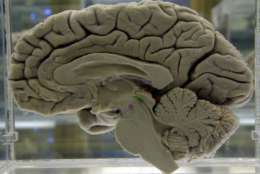Tom Temin
-
Commissioner Martin O'Malley wants top managers in 4 days a week, but it gets looser the farther out you go
February 01, 2024 -
It's the oldest challenge in government and business: How to make things easier for customers. In the digital age, customer service has evolved into something more ambitious: customer experience (CX). CX asks, among other things, how you get the idea of better service or experience down to the individual employee.
February 01, 2024 -
For many years, the Interior Department has used a simple procedure to do assessments of environmental damage. It concerns hazardous materials released to the Great Lakes and a few other coastal locations. Now Interior proposes to greatly expand the size of the cases covered by the simple procedure, and to apply it everywhere.
February 01, 2024 -
You might not think of the CIA is concerned with art or what it calls "the beauty in intelligence." But the agency, in fact, has an extensive art collection dating back to the late 1960s to go along with some artist who work there.
February 01, 2024 -
In today's Federal Newscast: The White House is widening the rule prohibiting employers from asking potential employees about their salary history. Cloud infrastructure providers are getting new cybersecurity requirements. And the chaos surrounding Red Sea shipping routes has jacked up the cost to relocate federal employees.
February 01, 2024 -
Illegal fishing harms the legal fishing industry and endangers the marine ecosystem. That is why the Coast Guard and other agencies spend so much time trying to detect and stop it. Now the National Geospatial Intelligence Agency is launching a prize challenge for data-based ways to get on top of illegal fishing.
January 31, 2024 -
A cloud computing security program established in 2011, continues to present difficulties to government and industry: FedRAMP, the Federal Risk and Authorization Management Program, is a way of establishing that cloud computing service companies are secure. But more than 12 years in, the program still has cost uncertainty. And agencies don't always use FedRAMP approved vendors, according to the Government Accountability Office.
January 31, 2024 -
Sometimes paperwork is just paper. A contractor submitted three bids for a contract to remove medical waste at facilities operated by the Health and Human Services. Only the middle of the three bids included an attachment. When it won the contract on the third bid, the company figured, the terms in the attachment applied. The government disagreed.
January 31, 2024 -
In today's Federal Newscast: The cybersecurity threat from Chinese infiltrators continues to grow, according to an outgoing Army general. The Department of Veterans Affairs got more than 46,000 homeless veterans into permanent housing last year. And employees at Social Security headquarters are ordered to increase in-person work, starting in April.
January 31, 2024 -
HHS is moving toward a zero trust architecture, collecting information on where it may be vulnerable and refining its approach.
January 30, 2024 -
Things are moving fast on the federal procurement front. New small business rules, GSA data gathering to club contractors with, all while appropriations seem to be forever in the future.
January 30, 2024 -
Brain injury, whether sustained at a test firing range or in battle, has long been a priority for the Defense medical system. The Warfighter Brain Health Initiative this year has boosted its research efforts on service members cognitive abilities and how certain events can threaten it.
January 30, 2024 -
While the threat of a partial government shutdown still looms, one group of federal employees has a message for Congress. Find a way past it. That is, in part, what concerns Federally Employed Women (FEW). For more, the Federal Drive with Tom Temin spoke with Pamela Richards, FEW's president.
January 30, 2024 -
In today's Federal Newscast: The Navy no longer requires a high school diploma to enlist. A long-time federal technology executive is retiring. And a former acting IG has been sentenced to 18 months in prison in a software-theft conspiracy.
January 30, 2024 -
The Pacific Northwest National Laboratory (PNNL) in Richland, Washington, has turned to Microsoft for high-performance computing requirements. In what it calls a multi-year collaboration, the lab and the software giant will apply artificial intelligence to speed up research in clean energy. For details, Federal Drive Host Tom Temin spoke with PNNL Associate Director and Chief Digital Officer, Brian Abrahamson.
January 29, 2024















